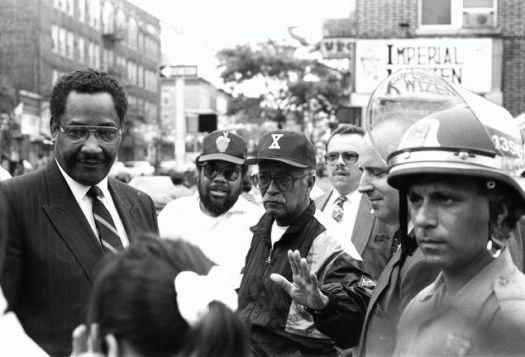
Daily News: De Blasio Had Front Row Seat to Riots
From the New York Daily News:
It was a wrenching conflict that tore at the city’s fabric. The four days of violence known as the Crown Heights riots exposed a deep racial divide and arguably cost Mayor David Dinkins his reelection. A young City Hall aide named Bill de Blasio — today, the overwhelming front-runner for mayor — had a front-row seat to the crisis.
He was a top aide to Dinkins’ point man in responding to the mayhem, Deputy Mayor Bill Lynch.
When it was over, a scathing report by Richard Girgenti, the state’s director of criminal justice, found serious communications and management lapses among mayoral aides — including Lynch — that likely delayed the Police Department’s effort to stop the violence.
In a brief interview with the Daily News, de Blasio downplayed his involvement.
As the disturbances raged, he remained at City Hall, he said, taking calls from irate Jewish leaders demanding more cops as the violence raged in the racially divided Brooklyn neighborhood.
“I remember vividly being on the receiving end of a deep, deep concern, particularly from members of the Jewish community,” he said.
De Blasio’s campaign refused to make him available for a more in-depth interview or answer written questions about his role.
The violence erupted on Aug. 19, 1991, after a 7-year-old black child, Gavin Cato, was killed by a speeding car driven by a Hasidic man that was part of a police-escorted motorcade carrying the Lubavitcher grand rebbe.
Bands of black youths attacked Jewish residents and cops. Amid cries of “Get the Jew!” a young Hasidic scholar, Yankel Rosenbaum, was stabbed to death.
It took four days before police responded more aggressively to restore order. By then, more than 150 cops and 38 civilians had been injured.
De Blasio came to City Hall in 1991 as a special assistant to Lynch. He was 30.
“Bill Lynch’s job was politics and outreach,” former Dinkins aide Michael Schlein said. “Bill de Blasio was Lynch’s right hand.”
Herbert Block, Dinkins’ liaison to the Jewish community, recalled de Blasio’s role during the Crown Heights crisis as “making sure Lynch was up to date.”
And Michael Kharfen, the head of the mayor’s Community Assistance Unit under Dinkins, said de Blasio “was being supportive and helpful and backing up the deputy mayor” as the unrest raged.
In his brief interview with The News, de Blasio said, “I was at the City Hall side of it in a minor capacity, so it was enough to see what was going on. It was hard to miss the fact that the timeline was continuing and the (police) response wasn’t strong enough.”
De Blasio didn’t detail the “concerns” he received from alarmed Jewish leaders as the unrest raged and what he did with that information.
Isaac Abraham, a Lubavitcher activist, was one of the Jewish leaders who contacted City Hall. He said he recalls speaking to Lynch and other aides — but not to de Blasio.
“Communications were continuously made directly to Herbie Block, to Michael Kharfen, to Bill Lynch,” Abraham said. “Continuously they knew what was going on.”
In his report, Girgenti found that Lynch and Kharfen were told by early Tuesday, the second day of the unrest, that the police response was inadequate, but that Dinkins said he was not made aware until the following day, when he ordered a change in police tactics.
“The evidence is persuasive that top City Hall officials, all of whom were in frequent contact with the mayor during the period of the crisis, were given crucial information,” the report said.
“This information was provided, in a dramatic and sustained manner, and was conveyed well before the mayor asserted that he was made aware of these circumstances.”
The report added, “If the mayor was told, fundamental questions would arise as to why he did not act on this information. However if the information was not provided to the mayor, systemic problems in City Hall’s flow of information and decision-making process are revealed.”
De Blasio’s name does not appear in Girgenti’s report.
De Blasio now calls the Crown Heights conflict a “horrible perfect storm” that included a changing of the leadership within the NYPD and tensions between black and Jews in the neighborhood.
He told The News he would have handled Crown Heights differently, but he offered few specifics.
Asked if he would have sent more cops into Crown Heights sooner, he said, “From day one. No question.”















FYI
Lee Brown, Police Commissioner for Dinkins, is on left in the photo.